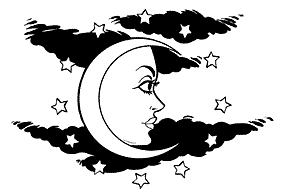Calendar, Anglo-Saxon Monandaeg
(Monandaeg, an Anglo-Saxon name for Monday)
Anglo-Saxon monandaeg, of course, stands for moon’s day and became our Monday. The Roman name for this day was dies lunae, “moon’s day”.
- Many primitive people revere the moon more than the sun because they reasoned that the Moon-mother gave her light at night, when it was needed, whereas the sun shined only by day. This belief did not consider sunlight and daylight as being the same.
- The Indo-European root word for both “moon” and “mind” were manas, mana, or men, which represented the Great Mother's “wise blood” in women who were governed by the moon.
- The pre-Roman Latin goddess Menrva (Minerva) is said to have come from mana or men, and it’s possible that we inherited such words as mentality, menstrual, menology, mensuration, mentor, menage (a matrilineal household), omen (a revelation from the moon), and amen (the moon of rebirth).
- Another possible derivative of manas, et al. is “mania” which once meant ecstatic revelation, just as lunacy meant possession by the spirit of Luna, the moon.
- To be “moon-touched” or “moon-struck” meant to be chosen by the goddess. Later when the moon goddess was denounced, these words came to mean insanity.
- The moon-struck person was described as “silly”, a word that formerly meant “happy”and “blessed”, and is conceivably derived from the Greek Selene, the moon.
- Apparently the Greeks considered menos to mean both “moon”and “power”.
- To the Romans, the morality of the moon-goddess was superior to that of the sun-god.
- Plutarch is quoted as saying, “The effects of the moon are similar to the effects of reason and wisdom, whereas those of the sun appear to be brought about by physical force and violence.”
- There is a primeval connection of the moon with “measuring”.
- The English word “moon” is rooted in the base me meaning “measure”; such as Greek metron, and in the English “meter” and “measure”, which reminds us of the moon’s early service as the first universal measurer of time.
- The moon-goddess is said to have created time, with all its cycles of creation, growth, decline, and destruction; which is why ancient calendars might have been based on phases of the moon and menstrual cycles.
- As the moon governed the sea’s tides, so she was also supposed to govern the tides of life and death among those who lived on land.
- There was once a conviction that a baby could be born only on an incoming tide, and a dying person could not depart until the tide went out.
- The Roman historian, Tacitus (c. 56-120 B.C.), wrote nearly two thousand years ago that the ancient Germans held their meetings at new or full moon, “the season most auspicious for beginning business.”

The best things about the “good old days” is that they are forever gone.
